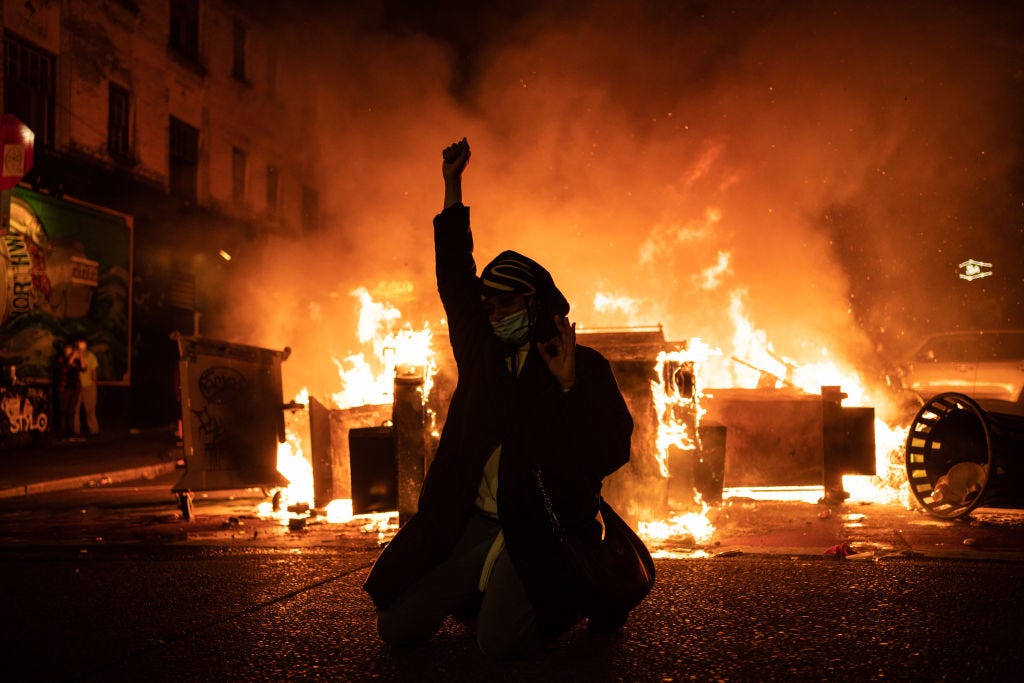Critical Race Theory, a Consolation Prize
you didn't ask for more culture war, you asked for change
What was it that you marched for, when you took the streets last year? Was it so that an obscure set of theories from legal education could be clumsily grafted on to school curricula in order to be implemented by overworked, sometimes hostile teachers and taught to bored and apathetic students no more engaged than they are with algebra? Or did you demand a new world?
All of the useless binarism of our culture war is on display in the debate about CRT. And in particular we see the way that, when the “other side” attacks, people rally around ideas and arguments that they might not actually care that much about, had their opponents not decided that this was the new target. I have to laugh when defenders of CRT say, accurately, that most critics don’t know anything about it; is the suggestion that the average social media defender of CRT has been diligently reading their Kimberle Crenshaw? No. Culture war exists to convince people that things are happening when they aren’t. When we fight about these things we’re doing the devil’s work. Should this piece escape from my regular readership into the broader internet, it will no doubt be represented as an expression of the CRT/anti-CRT culture war. But it isn’t. Those battle stations are already well-manned. What new of value could I say? This piece is an effort to get you to face up to it: very recently you asked for so much more than CRT, you’ve achieved none of it, and now this debate has sprung up to distract from that larger failure. And if we’re not careful that will be the future of identity politics in perpetuity, that we go to war to capture nothing of value.
To me, it seems clear that the most important development in American race relations in the past year has been the George Floyd Justice in Policing Act - which is to say, its failure. A bill which mostly banned practices that have already been banned in many states and cities and which created unenforceable policies that depended on the discretion of the very police it was designed to rein in, a bill derided by activists as a watered-down compromise, died quietly less than a year after we all screamed “never again.” In a presidential debate Joe Biden responded to the one police reform/BLM question by saying he wanted to fund the police more. I thought this would be a scandal; it was a “dog whistle” if I’ve ever heard one. But it passed unnoticed because it was not framed in the terms of culture war. The antipathy of a president from the supposedly-sympathetic party to meaningful police reform is vastly more consequential in real-world terms than critical race theory being taught/getting banned in some public schools. But no one notices because he’s their guy.
The bottom line is that Black people in America suffer most from material injustices, from poverty, violent crime, incarceration, police violence, environmental health hazards, food injustice, missing or decayed civic infrastructure…. Microaggressions didn’t kill Breonna Taylor. But the fashion now is to say that the best way to help Black America is by regulating white people’s social behavior, our thoughts and emotions. And white America is listening. “This idea that we, as white people, need to go out and make these big external actions — that’s just white supremacy,” said one of the good white people. That those “big external actions” would not just help Black people but would threaten her immense material privilege goes unsaid. Far safer to equate radicalism with social hygiene. Far easier to act like feelings are the unit with which we measure racial justice. The question is, how did the same misplaced sense of radicalism that burned down laundromats in 2020 produce $5,000 a plate antiracism dinners in 2021? How did we go so seamlessly from there to here? I’ll ask again: when you took the streets, what did you take them for? What did you demand? What are you demanding now? And how does any of this help us get there?
At some point, people who are dedicated to the pursuit of racial justice in the United States must do this mental work: they must acknowledge that nothing has changed since George Floyd died, and that there is no reason to think that anything will change soon. Whatever its problems or possibilities, its truth or its lies, CRT cannot achieve what you wanted our racial politics to achieve. You asked for so much more. Sooner or later you have to figure out where things went wrong, which starts with asking how you yourselves have failed. Doesn’t seem fair. Isn’t fair. But what in life is?




Saying something is wrong is a lot easier than providing a workable alternative. So is shouting radical slogans. Seeing a 4 fold increase in the murder rate in the Twin Cities since 2019, which in a move which should surprise no one, primarily affects the same communities that are the victims of police brutality, has made me feel a kind of cynicism I didn't think possible. I get the sense that the police have basically thrown certain parts of the metro to the wolves. And I sit here wondering, "Really, what else did anyone think would happen? Was it ever about more than a veneer of radical aesthetics at any point?"
To add to what Freddie said, I think a big and slightly more detailed question to ask is: If I invested this much emotional energy in critical race theory and this is the product of it, should I perhaps invest less energy in defending and promoting critical race theory and perhaps invest that energy in something else?